Meet Mageswari, the toy shop owner bringing joy to Pondicherry’s children
By Shivani Kochhar
Mageswari, a toymaker’s daughter, had always dreamed about owning a toy shop. But with no secondary school education and few assets to her name, her dream was destined to never become reality.
That’s life in India, where two out of three working households earn less than 1,000 INR (US $15) per month. Mageswari’s was one of them. She also had a son to worry about.
It runs in the family
Inspiration struck Mageswari’s brother: they could team up to open a toy shop together and sell their father’s hand-carved wooden toys. After all, in business two heads are better than one. But Mageswari’s brother also lacked a credit history or assets, and even microfinance lenders would not consider giving them a loan.
Pondicherry, India
A helping hand
That’s when Mageswari heard about Hand in Hand. The 40-year-old joined a Self-Help Group five years ago with the intention of securing a loan to bring their business idea to fruition. After completing her training, she pooled what little savings she had with a microloan from Hand in Hand India, bought the necessary equipment and rented a shop in the centre of Pondicherry.
The dream team
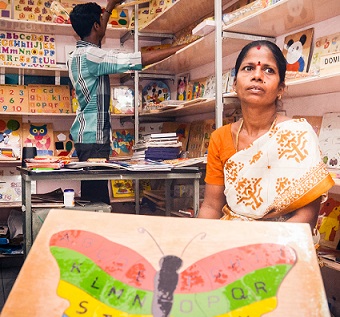 The toyshop was a huge success, reaching a monthly turnover of 57,000 INR (US $880). Brother and sister employ four of fellow Self-Help Group members, spreading their success around the community. “Other toy shops in Pondicherry only sell plastic toys – they are cheaper than our wooden toys but they also last less long,” says the soft-spoken but self-assured Mageswari. These toys leave a legacy.
The toyshop was a huge success, reaching a monthly turnover of 57,000 INR (US $880). Brother and sister employ four of fellow Self-Help Group members, spreading their success around the community. “Other toy shops in Pondicherry only sell plastic toys – they are cheaper than our wooden toys but they also last less long,” says the soft-spoken but self-assured Mageswari. These toys leave a legacy.
Mageswari’s brother, a born entrepreneur, took the initiative to reach out to local schools using a mail marketing campaign and the local press. The schools now place large orders for their toys. “I couldn’t have done this without Hand in Hand’s training and support,” he says. The siblings have even expanded the product range to include specialist Montessori toys.
A fairytale ending
Today, Mageswari has a degree of financial independence she could never have dreamt of before, along with a television and refrigerator to prove it. Most importantly, she can pay for her son’s college education. Before the toy shop, annual fees of 75,000 INR (US$1,166) made college unthinkable. Today, her son is in his second year of electrical engineering.
“We plan to expand our business by buying our own premises and additional machinery,” says Mageswari. Watch this space: maybe one day this brother-sister act will build their own toy shop empire.
Mageswari’s results
Toy shop earns 57,000 INR (US $880) a month
Able to put her son through college
Employs 4 staff from the community
Meet Manimozhi, grinding away for her family’s future
By Shivani Kochhar
With a grandchild on the way, Manimozhi needed funds fast. Her family business, a flour mill, was failing. But without capital and expertise she couldn’t change her fortunes.
A new family member
Manimozhi wanted to give her grandson the best start in life; in Pondicherry, this means being born in a private hospital. Only 1.2 percent of Indian gross domestic product is spent on public healthcare, and many government hospitals lack basic standards of hygiene, particularly in rural areas. For people like Manimozhi, they are an absolute last resort.
Pondicherry, India
Becoming a businesswoman
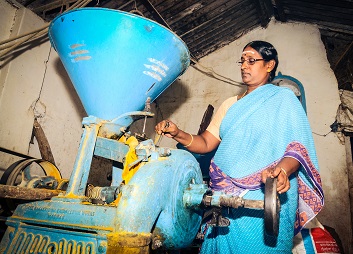 Manimozhi joined a Hand in Hand Self-Help Group with the hopes of using her loan to pay for the costs of the birth. Instead, after receiving training in financial literacy, she ploughed the loan into the faltering mill business she’d inherited from her father and paid for the birth using pure profit.
Manimozhi joined a Hand in Hand Self-Help Group with the hopes of using her loan to pay for the costs of the birth. Instead, after receiving training in financial literacy, she ploughed the loan into the faltering mill business she’d inherited from her father and paid for the birth using pure profit.
Manimozhi’s mill grinds rice, wheat and grains into flour or oil. It’s bring your own grain: customers are only charged for the grinding service. Using her loan, Manimozhi modernised the mill with an automated elevator that feeds paddy into the mill more quickly, speeding up production. Now, customers travel for 30 minutes by tractor to come to the mill. “I’ve opened my own private bank account so I can save better,” she says.
Keep calm and carry on
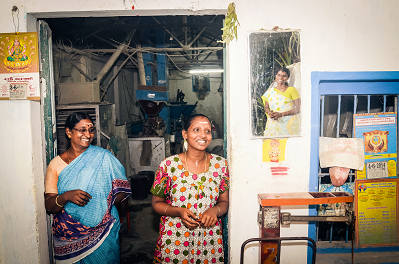
Those savings came in handy when the mill was damaged, its roof torn clean off, during a severe statewide storm that killed almost 50 people in Pondicherry and nearby Tamil Nadu. The cost of rebuilding was IRN 50,000 INR (US$ 766). With her savings in store, Manimozhi wasn’t held back: she got on with the rebuild quietly.
Manimozhi’s is now the longest standing flour mill in the area. The business has been in the family for 55 years and is already providing for two more generations. She now knows how to support her family through the good times and the bad.
Manimozhi’s results
Employs 4 staff members
Pays for grandchildren’s education
Supports 3 generations of her family
Meet Komala, who’s bringing beauty back into business
By Shivani Kochhar
Running her own beauty salon had been a dream of Komala’s since childhood, but lacking education and in her mid-30s, she was a housewife living on the brink of poverty instead.
The ugly truth
In India, one in five people are considered ‘poor’, living on less than $1.90 a day. This is partly due to the nature of employment: only 17 percent of jobs are salaried and one-third are irregular. Women looking for work have even more hurdles to overcome as there is large gender gap in the workforce. Just 27 percent of women participate in the labour force at all, compared to 79.1 percent of men. Clearly, the odds were against Komala – so she decided to take matters into her own hands.
Transformation
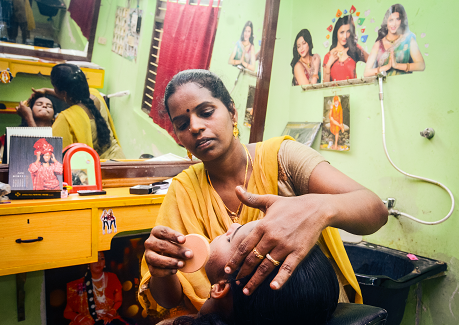
Things changed for Komala when Hand in Hand arrived in her panchayat. Inspired by her Self-Help Group’s promise of beautician training, not to mention a loan to get her started, she soon finished her training and opened up shop. With four beauty salons nearby already, she established a competitive advantage based on comparatively low prices and superior customer service. She is especially busy during wedding season when everyone needs to be pampered to perfection.
“Some of my neighbours have been motivated to start up a business of their own,” she says.
A touch of sparkle
Even with business humming, Komala found she had downtime during the day. That’s when she established a side-business embellishing saris with sequins and embroidery that now accounts for 30 percent of her income. But she wasn’t done there. Sensing opportunity, Komala qualified to become a beauty trainer herself, and today teaches up to 20 students a month. She earns INR 1,000 (US $15) per student and gets the satisfaction of helping other women start their careers. “Even though I am training members of my community, they see me as a professional,” says Komala.
Pondicherry, India
Looking forward
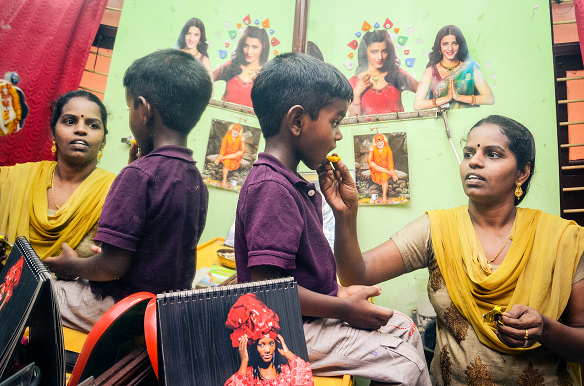
Together, her three streams of income bring in an average of INR 51,600 (US $770) a month. That’s enough to pay for life-changing appliances including a refrigerator and air conditioner. She can also afford some luxuries such as a TV. Next up: Komala is saving to buy a permanent home for her family and, when they grow up, pay for her two children’s university. “I hope that my son will become a doctor,” she says.
And her plans for her business? “I want to brand my salon with my own name, to make it stand out from others in the neighbourhood.” Sounds like a winning idea to us.
Komala’s results
![]()
Earns INR 51,600 (US $770) a month
![]()
Able to give her children a university education
![]()
Helps the community by teaching her skills to budding beauticians
Meet Jagadeeswari, the spice-seller with SME status
By Shivani Kochhar
Jagadeeswari could give any entrepreneur a run for their money. Five years ago, she was distributing her spices as free samples to neighbours and her business was making a loss. Fast-forward to today and she has won a state prize for ‘First-Generation SME Entrepreneur of the Year’. Her distribution network spans 200 shops across her home state of Tamil Nadu, and she sends her spices as far away as Malaysia. It’s a homegrown business gone global, and an unlikely success story in a state where 22.5 percent of people live below the poverty line, earning less than US $1.90 a day. Jagadeeswari’s successes are an exception to the rule rather than the norm – something that Hand in Hand aims to change.
Pondicherry, India
The perfect blend
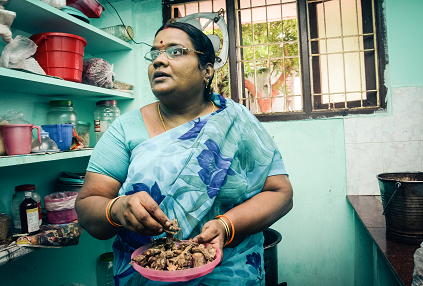
Jagadeeswari flourished at her Hand in Hand Self-Help Group. The energetic 46-year-old is a natural leader, and her fellow group members quickly selected her to be in charge. Jagadeeswari started selling her spices at food fairs and managed to grow her client base district-by-district until she had established a state-wide network. Recognising her potential, Jagadeeswari’s Hand in Hand trainer provided her with special training in bookkeeping and packaging.
“Joining the Self-Help Group changed my life totally,” says Jagadeeswari, who now produces a range of around 40 all-natural spices and food products. She is the only producer in town with such a wide range of condiments.
Sugar and spice
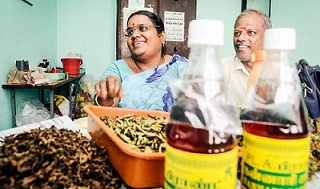 Jagadeeswari wanted to increase her product range and hit a winner: Sarpath. A refreshing all-natural sweet soda, it’s perfect for washing down all those spices. Now she earns 35,000 INR (US$ 525) every month in pure profit. She also employs five staff including her husband, who helps with marketing and sales. He’s pleased for Jagadeeswari: “I’m very happy about my wife’s success.”
Jagadeeswari wanted to increase her product range and hit a winner: Sarpath. A refreshing all-natural sweet soda, it’s perfect for washing down all those spices. Now she earns 35,000 INR (US$ 525) every month in pure profit. She also employs five staff including her husband, who helps with marketing and sales. He’s pleased for Jagadeeswari: “I’m very happy about my wife’s success.”
Woman power
As business is booming, Jagadeeswari has bought a separate building for her work and invested in a packing machine. Besides her husband, all her employees were formerly housewives and members of her Self-Help Group. Most importantly, the income generated from her spice business finances her son’s architectural training. Investing in her son’s education has already paid off – he helps her to do her marketing and created a website for the business. Jagadeeswari‘s children now call her “mother role model”. She’s their inspiration.
As for her Entrepreneur of the Year award, Jagadeeswari says she’s happy for the publicity – as long as it attracts new clients. Clearly, she never stops being the businesswoman.
Jagadeeswari’s results
Earns 35,000 INR (US$ 525) net profit per month
Sends her son to architectural school
Achieved SME level status
Meet Savitah from Kanchipuram, who’s gone from paper dreams to paper plates
By Shivani Kochhar
Savitah’s paper-plate business was making no profit at all. The 26-year-old newlywed had little experience of business. But she did have a drive to succeed.
A woman on a mission
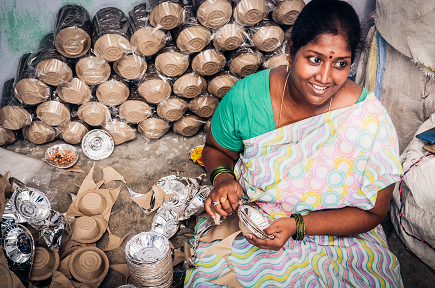
Savitah was inspired by her friends in Bangalore to go into business. Most of all, she admired the bravery of these female entrepreneurs for breaking the status quo: just 27 percent of women participate in the labour force at all, compared to 79 percent of men. Savitah initially attended a Self-Help Group to finance a paper-plate-making machine. One thing led to another: she completed bookkeeping training and realised that 85 percent of her total costs went on raw materials, preventing her from making a profit.
Savitah put every effort into sourcing cheap materials, knowing they could make or break her business, searching as far afield as Delhi (2,200 km away). In the end, she managed to find a supplier much closer to home in Chennai.
The secret to success
Today Savitah consistently undercuts her competitors – and watches her sales soar. With her savvy sourcing, she maintains a healthy 27 percent profit margin. This is boosted by the sale of off-cuts to paper merchants who use them to make recycled paper. It’s business-smart and environmentally sustainable. Her monthly net income, once zero, is now 21,500 rupees (US $350).
Kanchipuram, Tamil Nadu
Independent woman
Most of Savitah’s income has been reinvested in the business, but she keeps a little for herself so she can feel more independent in her daily life. “When I leave the house now, I don’t need to ask my husband for money,” she says.
Her husband questioned the need to buy a second machine but Savitah’s reasoning was as simple as it was compelling: “Anyone who buys a paper bowl will also need a paper plate, so let’s buy that machine, too.” Although she’s an entrepreneur at heart, Savitah says, “Before joining the Hand in Hand group, I would not have been confident to make a decision like that on my own.”
Team leader
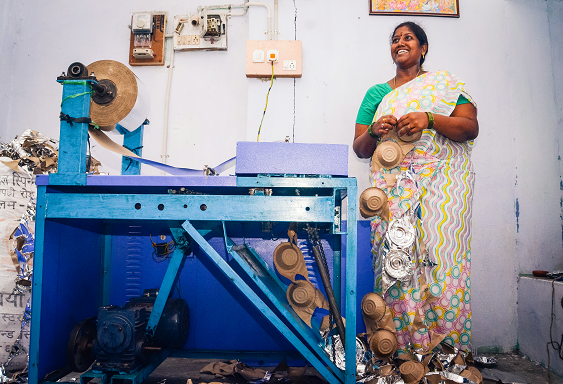
Savitah exudes a quiet confidence and determination, and since she first joined the group she’s persuaded five new members to join. Her peers chose her as their group leader, a role that entails managing meetings, teaching basic business skills and encouraging members to start their own businesses. A fast learner herself, she observes: “Sometimes it takes members so long to get up to speed with the concept; you have to be patient until they understand the approach.”
A working mum
Now 31, Savitah is expecting her first child but is confident that she will continue on her path as an entrepreneur and group leader. “I enjoy being independent and helping others to be independent, too,” she says.
Savitah’s results
Earns 21,500INR (US$ 350) net income per month
Voted to be the leader of her Self-Help group
Has financial independence
Meet Parvathi, the glove manufacturer from Tamil Nadu
With three children, one employee and a fast-growing business, Parvathi is the archetypal Hand in Hand entrepreneur. There’s just one difference: more than anyone we’ve met, the 52-year-old proves that it pays to invest in your children’s education. Literally.
Parvathi joined Hand in Hand and quickly set about establishing a knitting and embroidering enterprise. It wasn’t wildly successful, she says, but it earned enough to help put her children through university. Business was humming along fine when, a few years back, her son got his first job as an engineer – and along with it his first pair of protective gloves. And his second. And his third. Shocked at the quantity of gloves his workplace devoured, Parvathi’s son suggested she start a new line of business: manufacturing protective gloves. The switch wouldn’t be easy. For one, she would need to import an INR 500,000 (US $8,300) machine from Japan. But as a Hand in Hand Self-Help Group member for eight years, Parvathi knew where to turn.
Rural unemployment
Women entrepreneurs face huge barriers in India. According to the International Labour Organization the country ranks 120 out of 131 in women’s labour force participation. Rurally, barely one in three women work – 19.5 million fewer than just five years ago. The numbers are borne out in Tamil Nadu, the southern India state Parvathi calls home. More than 20 percent of residents here live below the poverty line, most of them rural. Access to credit can make all the difference.
Parvathi’s neighbourhood
Breaking the thatched ceiling
Parvathi borrowed the money from her group, imported the machine from Japan and got to work. Although her expenses had grown – materials had to be in ordered in bulk from Coimbatore almost 500 km away – so too did her profits. Parvathi now owns two knitting machines yielding INR 176,000 (US $2,900) a month, INR 54,800 (US $912) in pure profit. Loans to buy two more are pending.
“Ten years ago, I was even scared to go out of the house and speak to anyone,” she says. “Now I have even learned how to speak with bankers.”
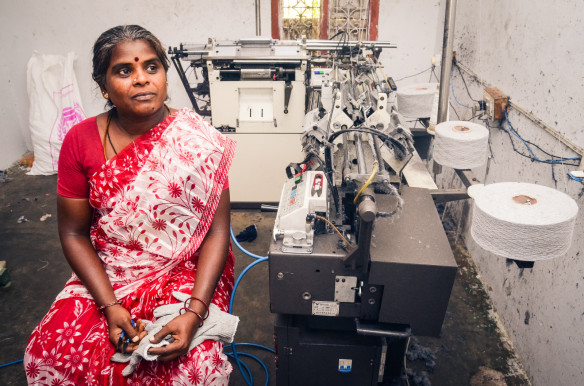 Parvathi’s self-confidence isn’t the only thing to have improved. Where once they shared a one-room thatched-roof hut, Parvathi’s family now live in a brand new concrete home. For the first time, the future looks bright.
Parvathi’s self-confidence isn’t the only thing to have improved. Where once they shared a one-room thatched-roof hut, Parvathi’s family now live in a brand new concrete home. For the first time, the future looks bright.
“I want to safeguard the future of my children with this business,” says Parvathi. And indeed she has. Only a year after starting his career as an engineer, Parvathi’s son is coming to work for the family business. The opportunities, he’d told her, are better.
“I worked hard and they rested,” she says. “Now it is my turn to rest and theirs to work”.
Parvathi’s results
Padmavathi, sculptor
Padmavathi is a 26-year-old mother of two. For her and her family life has been a long struggle. Although she was born into a sculpting family, and learnt the skill as a child, Padmavathi soon discovered it was not considered a profession for women. Her education was short-lived and then she was married off to a sculptor. Unfortunately, orders were hard to come by and their income was meagre.
Then Padmavathi heard about Hand in Hand and joined a Self-Help Group, where she was taught how to save, the basics of accounting and how to expand a small business. She took a loan not only to expand her husband’s business by buying raw material and better tools but also to take up sculpting herself.
She has already paid back that first loan and says “Repayment is not a problem. I made sure the loan is used only for business.”
The village still marvels at her transformation into a self-assured professional sculptor who earns anywhere between INR 7,000 and INR 10,000 a month (US $150 – 200).
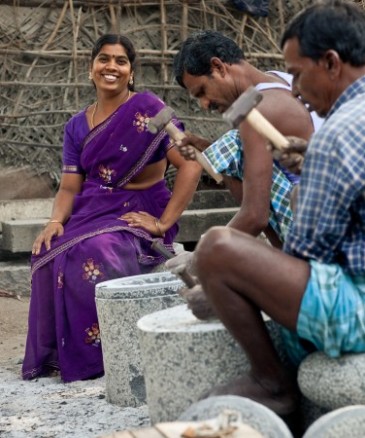
Bhanumathi, the mat manufacturer
Bhanumathi used to supplement the family income by making and selling coconut fibre mats.
Illness strikes
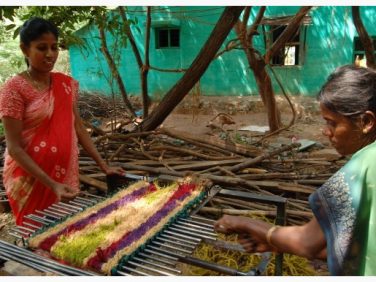 However, this side activity became their only source of income when illness forced her husband to close his welding business three years ago. Overnight their income fell from INR 7,000 (US $121) to INR 3,000 (US $52) per month.
However, this side activity became their only source of income when illness forced her husband to close his welding business three years ago. Overnight their income fell from INR 7,000 (US $121) to INR 3,000 (US $52) per month.
In desperation, Bhanumathi tried to increase the rate of production of her mats but with little education and no knowledge of how to run a business, she ended up making a loss.
Training leads to profits
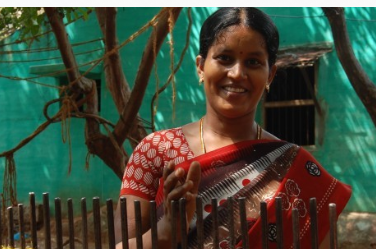
It was not until she joined a Self-Help Group that Bhanumathi learned how to successfully expand her business and turn it into a gainful enterprise. Today, Bhanumathi provides jobs for 10 local women and receives bulk orders from many wholesalers.
Bhanumathi’s Results
![]()
Net monthly profit of INR 9,000 (US $156)
![]()
Jobs for 10 local women
![]()
Bulk orders from wholesalers throughout the region
Chandra – The Brick Manufacturer
“It’s not an easy job. There is so much expenditure involved. We have to pay the labourers, provide them with food, not to forget the costs involved in collecting and transporting the raw materials that are needed to prepare the kiln,” says Chandra.
The 27-year-old is ending another long day of overseeing the brick kiln. In a few days, the readied bricks will be sold to a local contractor and it will only be a matter of time before Chandra and her husband start the arduous process of brick-making once again. Each brick is sold for INR 3 (USD 0.06) and depending on the order placed, Chandra sells anywhere between 10,000 and 100,000 bricks a month. Chandra has been assisting her husband in the family’s brick-making enterprise.
With little formal education and no entrepreneurial training, people like Chandra often find it difficult to deal with the challenges that come with running an enterprise. When Hand in Hand launched its intervention in her village at Thalikkal, Chandra joined the Venkatesh Self-Help Group.
“As an Self-Help Group member I learnt how to manage my finances better; how I could take a loan and strengthen my family’s enterprise,” she recollects.
And that’s precisely what she has done. The loan of INR 15,000 (USD 300) that she took was used to procure and transport more raw materials and employ more people. With more raw materials and a larger workforce, the family-based enterprise began reaping profits.
“Thanks to Hand in Hand, today our profits can sometimes reach even INR 20,000 (USD 400).”
Thalikkal, Tamil Nadu, India
Meet Usha, the taxi owner
“I had learnt sewing and I thought that would be a good enterprise to start since very few in the village knew to stitch,” explains Usha. Self-Help Groups have played a pivotal role in empowering many women. Usha is another striking example of the constructive difference Self-Help Groups can bring about.
An eager entrepreneur
Usha has always liked to make the most of any opportunity that comes her way. And so her family was not surprised when she joined Hand in Hand’s Chevendi Self-Help Group five years ago.
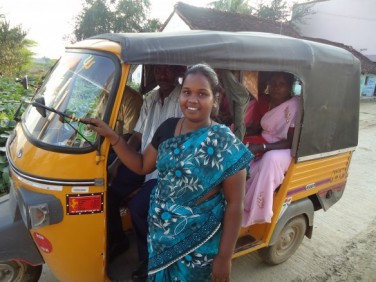 Through the first loan of INR 5,000 (US $83) made available to her she obtained a sewing machine and started a micro-enterprise. She began earning about INR 150 (US $2.50) a day and was able to supplement the meagre income that her husband earned as a farm labourer.
Through the first loan of INR 5,000 (US $83) made available to her she obtained a sewing machine and started a micro-enterprise. She began earning about INR 150 (US $2.50) a day and was able to supplement the meagre income that her husband earned as a farm labourer.
When the chance to obtain the second loan came by, Usha was clear on how she wanted to use it: buying a share auto (a three-wheeler public transport vehicle). “The main road is about 3 km away and apart from the government bus, there was no other means of public transport for villagers to commute in.”
She was the first person in the village to buy the share auto which is driven by her younger brother. Inspired by her, a few others followed suit. “I am happy that I have set up enterprises which not only help me but also people in our village,” she says.
Usha has always liked to make the most of any opportunity that comes her way
A successful trainer
Usha has also successfully trained 30 Self-Help Group women in tailoring, many of whom have set up their own enterprises. “I’m proud that I have been able to help other women set up similar enterprises, ” she says.
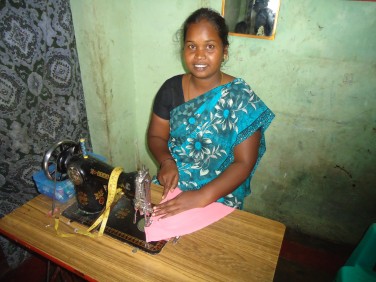
Through her tailoring & transport enterprise, Usha earns about INR 6,000 (US $100) a month. The amount is substantially more than the few-hundred her husband earns as a farm labourer.
Hand in Hand, she says, not only gave her the opportunity to become an entrepreneur, but it also gave her another chance at completing Grade 10. When Hand in Hand started its Village Uplift Programme at Thalikkal village, Usha came to know about the transit school that Hand in Hand runs for Grade 10 dropouts. Having failed the Grade 10 exams, Usha enrolled herself in the transit school and successfully cleared the Grade 10 exam.
Thalikkal, Tamil Nadu, India
Usha’s results
![]()
Trained 30 Self-Help Group members tailoring
![]()
Monthly earnings INR 6,000 (US $100)
![]()
Passed Grade 10 exam
